- Home
- Sean Platt
Yesterday's Gone: Seasons 1-6 Complete Saga Page 7
Yesterday's Gone: Seasons 1-6 Complete Saga Read online
Page 7
When they pulled up to Evergreen Square, the closest shopping plaza to their house, the emptiness got louder. The always-full parking lot had been reduced to just three cars. Bob pulled right up to the first spot in front of the Save-A-Lot.
“Let’s go shopping,” he grinned.
The store was dark inside, but not so dark you couldn’t see between the daylight and the store’s huge, glass facade. The automatic doors were dead, so Bob went back to his truck, opened a side panel and retrieved a crowbar.
“Stand back, kid, I’ve got a door to open.”
Charlie thought Bob would pry the doors apart. Instead, being the subtle kinda guy he is, Bob smashed the glass with the crowbar, until he’d made a big enough hole for them to climb through.
The store was dark and damned creepy without people inside. While Bob grabbed a shopping cart and headed straight to the beer aisle, Charlie was tasked to fill another cart with as much water and food as he could fit. If any other people were left, it wouldn’t be long before they’d be looting the store, too, Bob warned.
“Anyone too stupid to loot was just smart enough to die,” he said.
As Charlie navigated the aisles, he couldn’t help but feel a thrill from the all-you-can-grab shopping spree. Anything he wanted in the entire store — for free! He imagined Bob was filling his cart with nothing but beer. Maybe some canned meat products and pork rinds, too. The idea made him laugh. He could hear Bob on the other end of the store singing some country song about beer, which made him laugh harder. If Bob weren’t such an asshole half the time, Charlie might actually get along with the prick.
He loaded up on water and soda on one aisle and was shoving every battery pack, flashlight, and battery powered gadget he could find into his cart when he heard a noise one aisle over.
He froze, listening. All he could hear was Bob’s obnoxious singing. He was in the middle of his aisle, ready to run in either direction. He crouched down and moved closer to the source of the noise and then he heard footsteps.
Shit.
The barren store, hell, the barren town, the lack of power, and the general creepiness convinced Charlie he was about to come face to face with a zombie.
Shit, shit.
He crept toward the front of the store, abandoning the cart.
The footsteps, which were at the back of the store and heading away from him, reversed course, and were now following his path in the next aisle. He stopped. The other person stopped one step after.
Charlie was frozen in place, Bob’s drunken singing sounded as though it were a mile away.
He scanned his aisle, looking for something, anything he might be able to use as a weapon. He wished he were in the cutlery aisle, but the small tool aisle would have to do. He grabbed a generic-looking hammer, orange with a black handle. It wasn’t heavy, but it was metal, and he figured it could do a fair amount of damage.
He started toward the front of the store again, this time on tiptoe, hammer ready. Silence on the other aisle. He wondered if his stalker was staying put or creeping along with him. He gripped the hammer as he approached the end of the aisle. Once there, he’d have to make a decision whether to round the corner and confront whoever was there or start running and yell for Bob. He’d hate to be imagining things, then go running for Bob like a big baby, so he decided he’d turn the corner and let fate figure it out.
Bob was still singing, but now it sounded like the out-of-tune was coming from a mouthful of food. Fucker was probably chowing down on raw steaks.
Charlie inched toward the soda display at the end of the aisle, his heart in his throat as he rounded the corner. His shaky hand clutched the hammer, as he considered the ways he might use it when needed. Swinging it would require getting in close, and if the other person — or persons — had a better weapon, he was screwed. He could throw it, but if he missed, he’d be empty-handed. And he’d be facing an angry attacker.
He sat frozen and crouched at the end of the aisle, weighing his decision, and glancing toward the other end of the store to see if Bob was in sight. He wasn’t.
Charlie heard the footsteps, now in full sprint toward him.
He ducked down, and got ready to swing the hammer. As trouble ran toward him, he cried out, “Bob!”
He stumbled back just as the figure in blue jeans and a black hoodie shot past him and darted toward the front doors.
Bob came running, crowbar in hand, and glanced down at Charlie who had fallen to the ground. The person had hopped into Bob’s truck.
Bob raced from the store, yelling, “Hey, fucker!”
Charlie followed, gripping his hammer. As Charlie pushed through the front door, Bob yanked the hoodie-wearing punk from the cab and threw him to the ground. He brought the crowbar up and swung. The guy rolled out of the way at the last second and knocked Bob’s legs out from under him. Bob fell to the ground.
The guy hopped up and raced across the parking lot. Charlie followed, driven by adrenaline, and a desire to do something good in Bob’s eyes by catching the bastard who tried to steal his truck.
“Stop!” Charlie yelled, as he got closer, emboldened by both the hammer in his fist, and knowing Bob would surely be beside him in a moment and help him deal with the punk.
Though Charlie couldn’t see anything beneath the hoodie, he could tell the guy was shorter and skinnier than him. So long as he didn’t have a gun — and Charlie didn’t see one — he figured he might have a chance to win a fight for once in his life.
Charlie was almost close enough to grab the guy. He considered throwing the hammer at the back of the guy’s head, but didn’t want to slow down as he was almost ... catching ... up.
Just inches away, Charlie dropped the hammer, reached out with both hands and grabbed the hoodie, then yanked the guy back. They collided in a rough roll to the ground that lacerated Charlie’s arms and bruised his ribs and back, but he didn’t release his grip, and the two rolled until they’d come to a stop with the guy on top of Charlie. Only it wasn’t a guy, but rather, a young, black girl, close to his age, with short, curly hair and piercing, azure eyes.
He let go immediately. She stood, and their eyes locked in a tango of fear and survival. I’m not a threat, are you?
Just then, Charlie heard Bob’s thundering footsteps, then looked up to see him running up behind the girl, screaming with the crowbar raised.
“No!” Charlie screamed. The girl spun around just as the crowbar came down. It narrowly missed her head, but hit her hard in her right shoulder, sending her sprawling to the ground as she cried out.
Bob immediately brought the crowbar up again and was about to take another, surely lethal swing, when Charlie leaped at Bob, pushing him back, and sending the crowbar back where it bounced off the ground with a hollow metal thud.
“She’s just a kid!” Charlie yelled as Bob stumbled back, but didn’t fall.
Bob’s bloodshot eyes were crazy, his nostrils flaring. He was out of breath.
“She’s a kid, man. Relax,” Charlie gasped, leaning on his knees to catch his breath.
Bob’s eyes relaxed a bit and Charlie turned to the fallen girl, lying unconscious on the ground.
“Did I kill her?” Bob asked.
“I don’t think so,” Charlie said, leaning down to feel for a pulse.
Charlie wasn’t sure whether or not Bob was disappointed.
Eleven
Brent Foster
Brent wasn’t sure how long he hid in the pitch black, waiting for a looming dread to fade from the apartment. Maybe 20 minutes. Probably two hours. Hard to tell in the dark and with nothing to count.
He wasn’t sure what he was hiding from, either, but something in his lizard brain made him run from the downstairs apartment. Something told him if he stayed, he’d die. He hadn’t even worked up the courage to look out his windows.
What did he see?
Though he couldn’t see the man on the street’s face well enough to see his expression, his run told Brent all he nee
ded to know. The man was fleeing death.
Maybe the city had suffered a terrorist attack, and the man saw the bad guys coming. Or, Brent suddenly thought, perhaps the man had something to do with what happened and was running from the police or Army or whoever the hell was now in control of the city.
Brent had only recently moved to New York, so he was a tourist to 9/11, not a citizen. But he knew enough to know someone was surely out there evacuating people, searching for survivors, or both. He couldn’t expect someone to find him; he’d have to find them. And that meant leaving the building.
He went back into the living room, glanced out the window and down to the street below. The city, or what he could see of it, was a morgue. He went to the fridge and grabbed another water, sat on his couch, and put his feet up on the coffee table, where a framed photo of his family faced him.
They took the picture last Christmas, just in time for cards. Brent thought sending family photos for cards was smarmy, but Gina insisted. He wondered if it was something women did to compete with their friends to prove who really had a nicer-looking or happier family. All Brent saw in 90 percent of the photos were uncomfortable children and miserable spouses holding tight to a veneer of love.
Merry Christmas, indeed.
He held the photo, eyes fixed on Ben’s joyous smile.
Brent hadn’t wanted kids, not really. The world was far too fucked for that. Ben was an accident. Gina’s plumbing made him a one in a million shot at best. Same as Ben’s odds when Gina was rushed to the hospital bleeding at seven and a half months.
Only then did Brent realize how much he’d come to love the thought of having a son, and let his cynicism face the light of hope. When the doctors came out to update him on the status of the emergency C-section and told him he had a son, he was nothing but tears. And when he finally saw his son in the Neonatal Intensive Care Unit, his heart melted. Ben was their miracle. And for one not inclined to believe in miracles, that was no small statement.
Sitting there on the couch, Brent felt guiltier than ever about trading his family for work.
He’d always wanted to be a reporter. When he landed a gig in New York, his dream came true. Sure, it wasn’t The Times, just The Apple Tribune, but still, he was in the heart of it all, covering features in the city of a million stories. But the newspaper business was dying: the Internet, evaporating advertising, and a cast and crew that couldn’t stop the bleeding. As the cuts came, he was always spared (so far), but it meant working that much harder to survive the next round.
He rarely saw his family.
It was a temporary sacrifice, he told himself, and a necessary one. He was working toward something, and getting there a word at a time. And he knew good writers, damned good writers, who were unemployed, hungry, and writing anything they could just to keep food in their fridge.
And while he used to dream of the life of a newspaper writer in New York, as something close to being famous, or at least respected, the reality of his role was a slap in the face. Most people treated him like shit. Especially people who disagreed with the politics of his paper, something he had nothing to do with. He was a features guy, telling nice, little stories about the city and its eclectic denizens.
But most people didn’t care. You work for the wrong paper, they treat you like a lying, thieving, evil bastard. And even when they didn’t hate him for the paper’s politics, they often bitched when he got some little facet of a story wrong, or more often, didn’t stick with the narrative they imagined the story would take. It never ceased to amaze him how many people would get bent out of shape or threaten lawsuits over a nice story!
Now, sitting alone with no idea where his family was, the vanity of his job was apparent. He was too busy trying to impress strangers and win their love, while neglecting his family who already loved him.
Brent pulled Stanley Train from his pocket, looked at the train’s big, goofy smile, and he felt his heart fade into an ache. Ben was gone. The thought that he might never play with his toy train again shattered Brent into tears.
Brent spent about half an hour feeling sorry for himself while fear ran rampant in his head. Then something swelled inside him. Anger. Anger at himself and his inaction. His family was out there — he hoped — and it was his job to find them.
He grabbed a backpack from his closet, filled it with food, drinks, and clothes, wrote his wife another note — this one saying he’d be back at midnight — and headed out the door. He left it unlocked since Gina left her keys inside. If someone broke in, let ‘em. Halfway down the hall, he raced back to his apartment, grabbed the framed photo from the couch, put it in his backpack, and headed out into the city.
First, though, he’d need a gun. He found one in the fourth apartment he kicked in. A revolver with a box of bullets. He’d fired a gun twice at a range, but never owned one. No matter, he knew enough to be dangerous.
He stepped out of his apartment building and onto the street. The air was cool, and a fog was rolling in, like a wooly icing atop the haunted hallways of the abandoned, concrete empire. Brent couldn’t smell any smoke, or anything out of the ordinary. A good sign, he guessed.
He stared off in the same direction as the man had been staring before losing his shit, but saw nothing odd. Well, no odder than the ghost streets, and buildings getting swallowed by the fog descending on the city. The fog was different than normal, though Brent couldn’t quite place what the difference was.
He crossed the four lanes of West End Avenue to the apartment building the man had ducked into. It was roughly the same size as his, 15 stories tall. He wasn’t sure how he’d find the guy, or if he’d be dangerous, but Brent had to establish contact with the only person he’d seen.
When he reached the double doors that would normally be locked or tended by a doorman, he noticed that one of the two windows was shattered. Glass covered the red doormat inside. Brent put his hand on the gun tucked inside his jacket and stepped through the doorway. Glass crunched beneath his sneakers. The lobby desk was deserted, and the elevators were dead, which meant he had to take the stairs and begin his ascent.
The stairwell was dimly lit by emergency lights. His footsteps echoed off the walls. He didn’t bother with stealth. He hoped the guy, if he were still around, would show himself so Brent wouldn’t have to search the whole damned building.
Brent got his wish as he opened the door to the second-floor landing and came face to face with a pistol. On the other end of the gun, a wild-haired, disheveled, skinny guy in his late 40s or early 50s wearing thick, black-rimmed glasses. Brent’s hand held his gun tight in his pocket, but made no move to reveal it. Instead, he aimed it at the guy, through his jacket.
“Anyone see you come in here?”
Brent shook his head, “No, I don’t think so. I didn’t see anyone out there.”
“Who sent you?” the guy asked, his voice tuned to nervous.
“Nobody, my name is Brent Foster, I live across the street. I’m looking for my family.”
“Brent Foster?” the guy said, his eyes darting up for a moment, accessing memory. “Brent Foster who writes for the Tribune?”
Great, the moment he’d always hoped would never happen. Some wacko with a gun recognizing him as a reporter. Hope he’s a fan.
“Yes,” Brent said, reluctantly, bracing for reaction.
The guy lowered the gun, and a broad smile crossed his face.
“Stanley Byrd, but you can call me Stan. I’m a big fan of your work, sir.” the guy said, putting the gun awkwardly in a jacket that was about 20 years out of fashion.
Brent let go of his own gun and shook Stan’s clammy hand.
“What have you heard? Did you see anything?”
“Nothing,” Brent said, “I woke up, and my wife and son were gone. And apparently, the whole damned apartment building, and everyone on the streets is gone, too.”
“Yeah, the whole city is gone, but not just the city.” Stan said with the certainty of someone who took such
things in stride.
“What do you mean?”
“Come, come, I want to introduce you to some people,” Stan said, turning and heading down the hall. “I can’t believe you’re here. I read that story you did on the blind jazz guy who plays in the subways to put his son through college. Goddamn, that was beautiful stuff.”
“Thanks,” Brent said, following, hand in his jacket. Just in case.
Stan brought him to the last apartment in the hallway, knocked three times, paused, then knocked twice, paused again, then two more quick knocks.
Bolts, several of them by the sounds of it, unbolted, and the door opened. A bald, buffed, stone-faced Hispanic in a tight, black tee greeted them, arms drowning in ink. He nodded and let them in.
All charm, this one.
Sitting on a sofa even older than Stan’s clothes, was a blonde-haired woman in her early 40s or so. She reminded Brent of a doctor or scientist, and he was rarely wrong when judging people by appearance. Stan was nuts, muscles was angry, and the lady, well, she was probably the brains of the bunch.
Muscles locked the door, and Stan introduced everyone.
“Everyone, this is Brent Foster, from the Tribune. Brent, this is Luis Torres, who lives five floors up. And this is Melora Mitchell, who lives in your building, actually.”
Luis nodded. Melora stood up and reached out to shake Brent’s hand. Her hand was cold, thin. She retreated quickly — or perhaps Brent was just imagining things — as if she were aware of Brent’s judgment of her hand’s temperature.
“Have a seat, Brent,” Stan said.
Brent took a seat in one of two recliners across from the couch. Stan took the other, while Luis stood up, arms crossed.
“We didn’t think we’d find another,” Melora said. “How long have you been having the dream?”
Brent didn’t have a chance to ask what she was talking about.
“Where were you at 2:15 a.m.?” Stan asked. It seemed as if he were waiting for a specific response to the time.

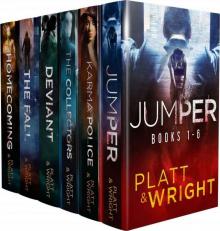 Jumper: Books 1-6: Complete Saga
Jumper: Books 1-6: Complete Saga WhiteSpace Season One (Episodes 1-6)
WhiteSpace Season One (Episodes 1-6)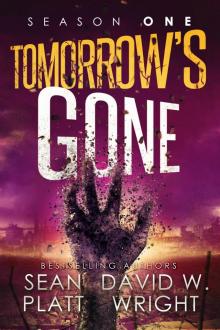 Tomorrow's Gone Season 1
Tomorrow's Gone Season 1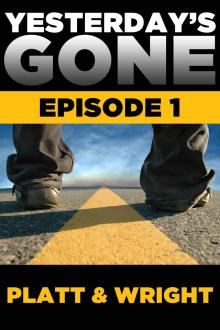 Yesterday's Gone: Episode 1
Yesterday's Gone: Episode 1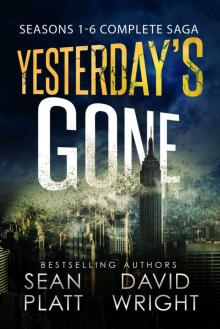 Yesterday's Gone: Seasons 1-6 Complete Saga
Yesterday's Gone: Seasons 1-6 Complete Saga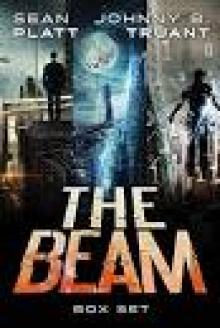 The Beam- The Complete Series
The Beam- The Complete Series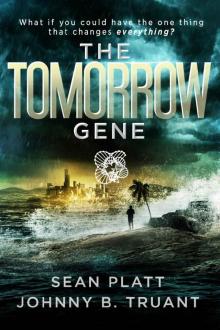 The Tomorrow Gene
The Tomorrow Gene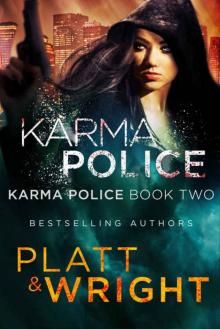 Karma Police: Karma Police Book Two
Karma Police: Karma Police Book Two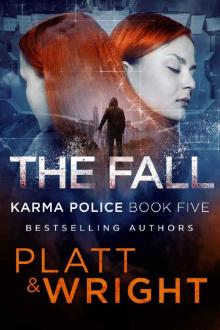 The Fall (Karma Police Book 5)
The Fall (Karma Police Book 5)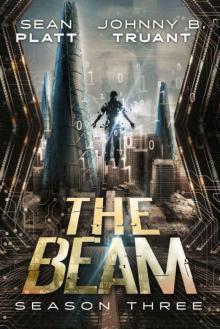 The Beam: Season Three
The Beam: Season Three Resurrection
Resurrection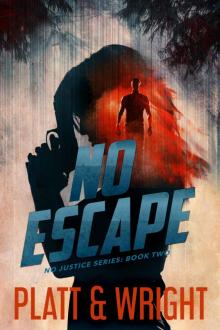 No Escape (No Justice Book 2)
No Escape (No Justice Book 2)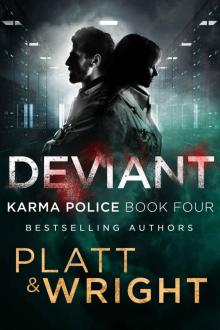 Deviant (Karma Police Book 4)
Deviant (Karma Police Book 4)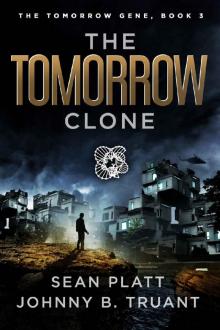 The Tomorrow Clone (The Tomorrow Gene Book 3)
The Tomorrow Clone (The Tomorrow Gene Book 3)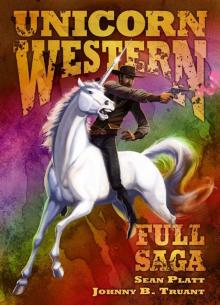 Unicorn Western
Unicorn Western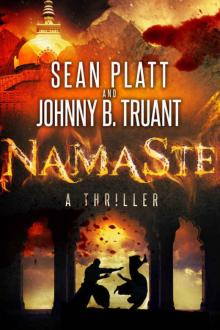 Namaste
Namaste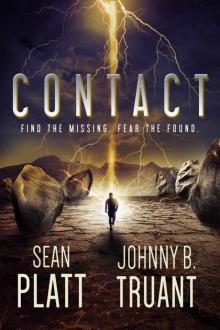 Alien Invasion (Book 2): Contact
Alien Invasion (Book 2): Contact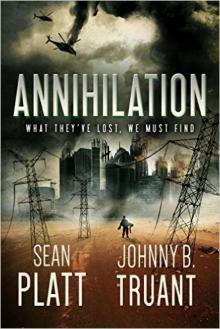 Alien Invasion (Book 4): Annihilation
Alien Invasion (Book 4): Annihilation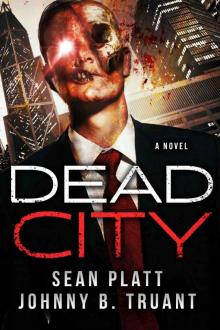 Dead City
Dead City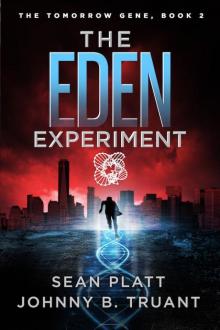 The Eden Experiment
The Eden Experiment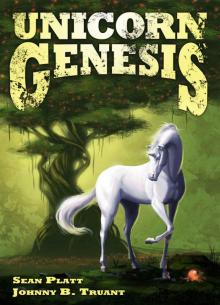 Unicorn Genesis (Unicorn Western)
Unicorn Genesis (Unicorn Western)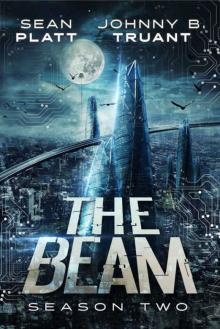 The Beam: Season Two
The Beam: Season Two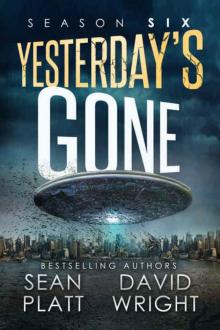 Yesterday's Gone: Season Six
Yesterday's Gone: Season Six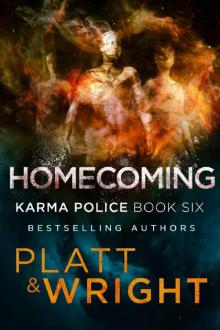 Homecoming (Karma Police Book 6)
Homecoming (Karma Police Book 6)![[Alien Invasion 01.0] Invasion Read online](http://i1.bookreadfree.com/i1/03/30/alien_invasion_01_0_invasion_preview.jpg) [Alien Invasion 01.0] Invasion
[Alien Invasion 01.0] Invasion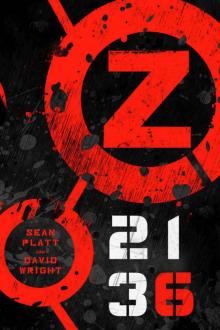 Z 2136 (Z 2134 Series Book 3)
Z 2136 (Z 2134 Series Book 3)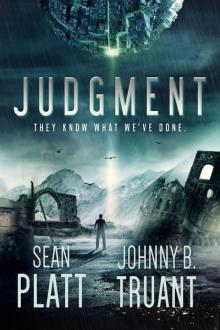 Alien Invasion (Book 5): Judgment
Alien Invasion (Book 5): Judgment Threshold
Threshold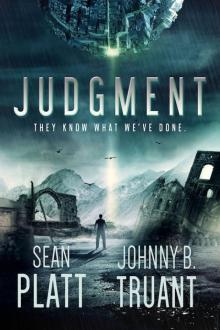 Judgment
Judgment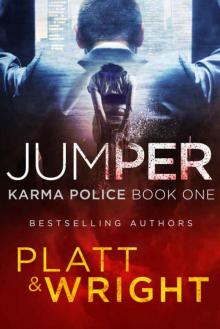 Jumper: Karma Police Book One
Jumper: Karma Police Book One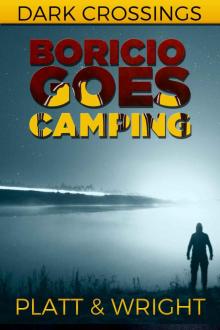 Boricio Goes Camping (Dark Crossings)
Boricio Goes Camping (Dark Crossings)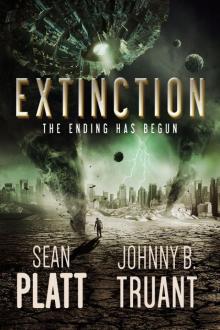 Extinction
Extinction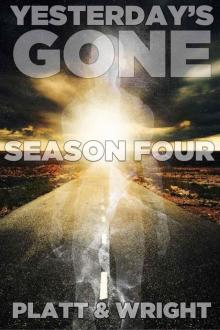 Yesterday's Gone (Season Four): Episodes 19-24
Yesterday's Gone (Season Four): Episodes 19-24![[No Justice 01.0] No Justice Read online](http://i1.bookreadfree.com/i2/04/09/no_justice_01_0_no_justice_preview.jpg) [No Justice 01.0] No Justice
[No Justice 01.0] No Justice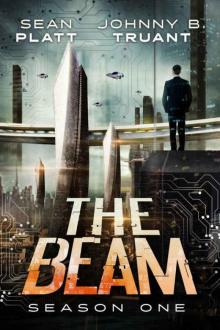 The Beam: Season One
The Beam: Season One La Fleur de Blanc
La Fleur de Blanc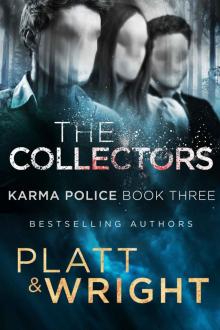 The Collectors (Karma Police Book 3)
The Collectors (Karma Police Book 3)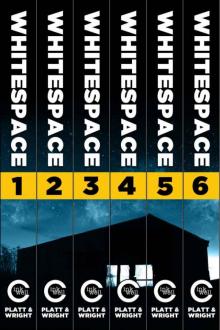 WhiteSpace: Season One (Episodes 1-6 of the sci-fi horror serial)
WhiteSpace: Season One (Episodes 1-6 of the sci-fi horror serial)